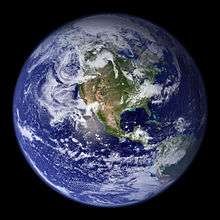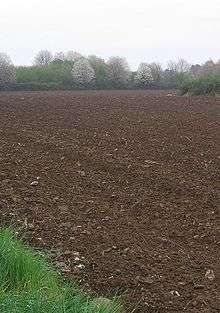earth
English
Etymology
From Middle English erthe, from Old English eorþe (“earth, ground, soil, dry land”), from Proto-Germanic *erþō (“earth, ground, soil”) (compare West Frisian ierde, Low German Eerd, Dutch aarde, Dutch Low Saxon eerde, German Erde, Danish, Swedish and Norwegian jord), related to *erwô (“earth”) (compare Old High German ero, perhaps Old Norse jǫrfi (“c”)), from Proto-Indo-European *h₁er- (compare Ancient Greek *ἔρα (*éra) in ἔραζε (éraze, “on the ground”), perhaps Tocharian B yare (“gravel”).
Probably unrelated, and of unknown etymology, is Old Armenian երկիր (erkir, “earth”)). Likewise, the phonologically similar Proto-Semitic *ʾarṣ́- (whence Arabic أَرْض (ʾarḍ), Hebrew אֶרֶץ (ʾereṣ)) is probably not related.
Pronunciation
- (Received Pronunciation) IPA(key): /ɜːθ/
- (US) IPA(key): /ɝθ/
Audio (US) (file) Audio (UK) (file) Audio (file) - Rhymes: -ɜː(ɹ)θ

Proper noun
earth
Usage notes
- The word earth is capitalized to Earth when used in context with other celestial bodies.
Translations
Noun

earth (countable and uncountable, plural earths)
- (uncountable) Soil.
- This is good earth for growing potatoes.
- (uncountable) Any general rock-based material.
- She sighed when the plane's wheels finally touched earth.
- The ground, land (as opposed to the sky or sea).
- 2013 June 7, David Simpson, “Fantasy of navigation”, in The Guardian Weekly, volume 188, number 26, page 36:
- Like most human activities, ballooning has sponsored heroes and hucksters and a good deal in between. For every dedicated scientist patiently recording atmospheric pressure and wind speed while shivering at high altitudes, there is a carnival barker with a bevy of pretty girls willing to dangle from a basket or parachute down to earth.
- Birds are of the sky, not of the earth.
-
- (Britain) A connection electrically to the earth ((US) ground); on equipment: a terminal connected in that manner.
- A fox's home or lair.
- The world of our current life (as opposed to heaven or an afterlife).
- 1819, John Keats, "Ode on a Grecian Urn"
- "Beauty is truth, truth beauty," - that is all / Ye know on earth, and all ye need to know.
- 1819, John Keats, "Ode on a Grecian Urn"
- (alchemy, philosophy and Taoism) The aforementioned soil- or rock-based material, considered one of the four or five classical elements.
Derived terms
- Blue Earth, Blue Earth County, Blue Earth River
- diatomaceous earth
- down-to-earth
- earth closet
- Earth Day
- earth mother
- Earth Summit
- earth to earth, ashes to ashes, dust to dust
- earth tone
- earthbound or earth-bound
- earthen
- earthenware
- earthquake
- earthling
- earthly
- earthly paradise
- earthquake
- earth-shattering
- earth sign
- earth station
- earthworm
- earthy
- ends of the earth
- flat earthers
- go to earth
- Mother Earth
- rare earth
- rare earth mineral
- run to earth
- salt of the earth
- scorched earth
- unearth
Translations
|
|
|
|
|
|
|
|
|
|
|
|
|
- The translations below need to be checked and inserted above into the appropriate translation tables, removing any numbers. Numbers do not necessarily match those in definitions. See instructions at Wiktionary:Entry layout#Translations.
|
|
Verb
earth (third-person singular simple present earths, present participle earthing, simple past and past participle earthed)
- (Britain, transitive) To connect electrically to the earth.
- Synonym: ground
- That noise is because the amplifier is not properly earthed.
- (transitive) To bury.
- Young
- The miser earths his treasure, and the thief, / Watching the mole, half beggars him ere noon.
- Young
- (transitive) To hide, or cause to hide, in the earth; to chase into a burrow or den.
- Dryden
- The fox is earthed.
- Dryden
- (intransitive) To burrow.
- (Can we find and add a quotation of Tickell to this entry?)
Derived terms
Translations
|
|
|